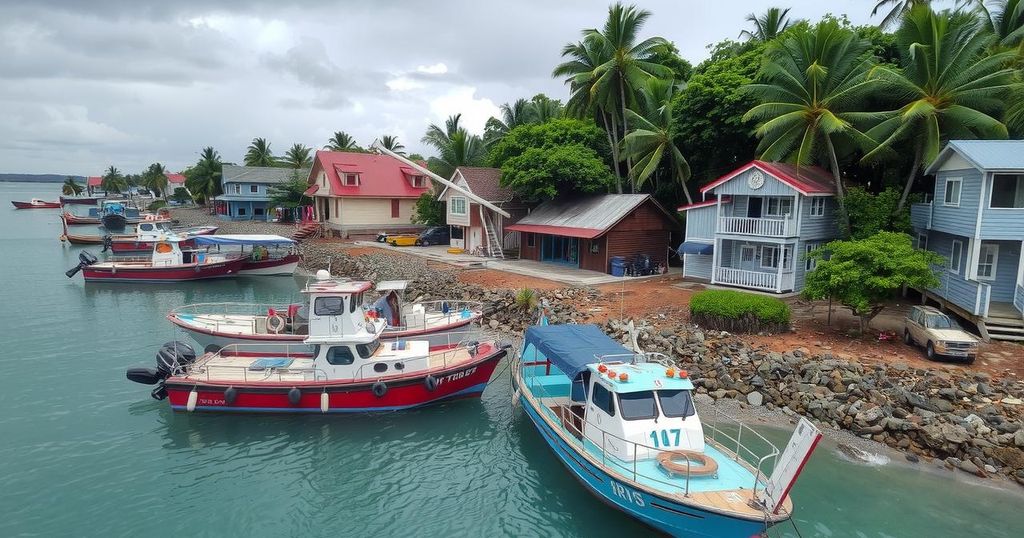France Rushes Aid to Mayotte Following Deadly Cyclone Chido
France is providing urgent assistance to Mayotte following Cyclone Chido, which resulted in significant devastation and raised fears of a high death toll. Ongoing rescue operations are complicated by damage to infrastructure and the region’s socio-economic challenges. The cyclone, which has affected other areas in the region, highlights the increasing threat of severe weather patterns exacerbating vulnerabilities in impoverished territories.
On Monday, France mobilized significant aid to Mayotte, a French overseas territory in the Indian Ocean, after the region experienced its most devastating cyclone in nearly one hundred years. Cyclone Chido struck the island on Saturday, leading to fears that hundreds, if not thousands, may have perished in its aftermath. Rescue operations are underway, with medical teams and essential supplies being dispatched from mainland France and the nearby territory of Reunion as authorities grapple with the extent of the destruction.
As the rescue efforts continue, French authorities reported that the official death toll had reached fourteen, even as estimates suggested that the actual number of fatalities could be substantially higher. The Prefect of Mayotte, François-Xavier Bieuville, indicated that the cyclone had caused catastrophic damage to the island’s poor neighborhoods, which are predominantly composed of informal housing, making accurate casualty assessments difficult. Given the cultural practice of burying the deceased within twenty-four hours, many victims may remain uncounted.
In addition to the human toll, Cyclone Chido inflicted extensive damage to critical infrastructure, including the main airport and medical facilities, leading to power outages throughout Mayotte. This damage to the airport control tower has restricted incoming aid to military flights, complicating the overall response to the disaster. French Interior Minister Bruno Retailleau arrived on the island to oversee relief efforts and assess the situation firsthand, stating that determining the full extent of human loss would take considerable time.
The cyclone’s impact extended beyond Mayotte; it also struck the Comoros and Madagascar, while making landfall in Mozambique, affecting millions of people in one of the poorest regions globally. The cyclone season in the southwestern Indian Ocean and southern Africa has become marked by increasingly severe storms, raising concerns about preparedness and response in these vulnerable territories, especially in the wake of previous disasters like Cyclone Idai in 2019.
Mayotte is regarded as France’s poorest department and often attracts migrants from neighboring countries seeking better living conditions. The population, estimated at approximately 300,000, faces myriad challenges, further compounded by the cyclone’s destruction, heightening the urgency of immediate and effective humanitarian assistance as rescue operations are set to expand in the coming days.
As rescue crews mobilize and aid begins to arrive, the island’s recovery will require not only immediate assistance but also long-term strategies to address the impoverished conditions that leave regions like Mayotte vulnerable to such catastrophic events in the future.
The article discusses the immediate aftermath of Cyclone Chido, which hit Mayotte—a relatively impoverished French overseas territory. The cyclone is noted as one of the most destructive in nearly a century, indicating systemic vulnerabilities in Mayotte’s infrastructure and housing conditions. Additionally, the seasonal pattern of cyclones in the region and past devastating storms put into context the alarming frequency and severity of such natural disasters in the southwestern Indian Ocean.
In conclusion, the rapid response by France to the devastating effects of Cyclone Chido underscores the urgency of rescuing and assisting the affected populations in Mayotte. With estimates suggesting a significantly higher death toll than the official reports, the challenges faced by rescue teams are compounded by the territory’s socio-economic conditions. This disaster serves as a reminder of the need for ongoing support and resilience-building initiatives in vulnerable regions such as Mayotte, particularly as the frequency of such extreme weather events continues to rise.
Original Source: ny1.com




Post Comment